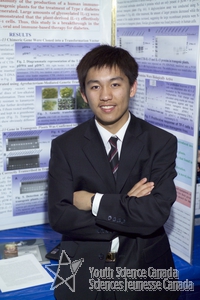
David Wang
PRODUCTION OF INTERLEUKIN-13 (IL-13) IN TRANSGENIC PLANTS FOR IMMUNOTHERAPY OF TYPE 1 DIABETES
A.B.Lucas S.S.
Type 1 diabetes (T1D) is a chronic, life threatening, autoimmune disease. Currently there is no effective therapy for this disease. Accumulated evidence suggests that Tlymphocytes including T helper 1 (Th1) and T helper 2(Th2) play a crucial role in T1D development. The disease is primarily mediated by Th1 lymphocytes that synthesize inflammatory cytokine interferon ã (INF-ã), whereas the Th2 cells, which produce anti-inflammatory cytokines, have a beneficial, protective role. Thus, induction of selective deviation (skewing) of harmful Th1 responses towards a protective Th2 phenotype using Th2 cytokines such as IL-13 represents the most promising antigen-specific therapeutic approach. The objective of this study is to produce large amounts of IL-13 in transgenic plants and test if the plant-derived cytokines can be used for oral administration to treat T1D. The human IL-13 gene was cloned and fused with the bacterial CTB gene encoding the mucosal carrier CTB protein that will facilitate effective delivery of the CTB-IL-13 recombinant protein to the gut mucosal cells. CTB-IL-13 and IL-13 were cloned into a plant transformation vector under the control of a constitutive expression promoter. Low-nicotine tobacco was used for Agrobacterium-mediated genetic transformation. PCR analysis confirmed the presence of the transgenes in the transgenic plants. The expression of IL-13 and CTB-IL-13 in the transgenic plants was demonstrated by northern blot hybridization and western blot analysis. The availability of transgenic plants producing IL-13 and CTB-IL-13 recombinant proteins provides a solid foundation for the development of a plant-based, safe, cost-effective, oral therapy for treatment of T1D.
| Award | Value |
|---|---|
| First Award – Botany – Presented by Intel Foundation | $300 |
| Honorable Mention Award – Endocrine Society | |
| Mathematica software package for all Intel Grand award first place winners. – Wolfram Research, Inc. |
